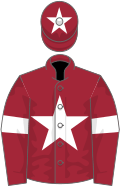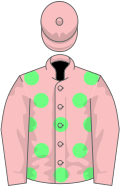Dawn Run Mares Novice Chase
The Dawn Run Mares Novice Chase, currently known for sponsorship purposes as the Charleville Cheese Irish EBF Mares Novice Chase, is a Grade 2 National Hunt novice chase in Ireland which is open to mares aged four years or older. It is run at Limerick over a distance of 2 miles and 6 furlongs (4,425 metres). The race is scheduled to take place each year in March.
| 2019 | ||
 |
[[ | Unavailable | 92px]] |  |
| Moyhenna | Oh Me Oh My | Redhotfillypeppers |
| Previous years | ||
|---|---|---|
| 2018 | ||
 |
 |
 |
| Youcantcallherthat | Dinaria Des Obeaux | West Bridge |
| 2017 | ||
 |
 |
 |
| Daisy's Gift | Slowmotion | Goulane Davina |
| 2016 | ||
 |
 |
 |
| Bonny Kate | Uranna | Emcon |
| 2015 | ||
 |
 |
 |
| Vroum Vroum Mag | Shesaportrait | Perfect Promise |
| 2014 | ||
 |
 |
 |
| Caoimhe's Delight | Civena | Backinthere |
| 2013 | ||
 |
 |
 |
| Charlie's Vic | Avondhu Lady | Dangan Daylight |
| 2012 | ||
 |
 |
 |
| Knockfierna | Special Token | Ask Me Sister |
| 2011 | ||
 |
 |
 |
| Aura About You | For Bill | Gentle Alice |
| 2010 | ||
 |
 |
 |
| Inistioge | Cara Mara | Hello Kitty |
| 2009 | ||
 |
 |
 |
| Moskova | Leanne | Go Sandy Go |
| 2008 | ||
 |
 |
 |
| Candy Girl | Callherwhatulike | Its A Ladys Deal |
| 2007 | ||
 |
 |
 |
| Laetitia | Sabina Park | Sea Diva |
| 2006 | ||
 |
 |
 |
| American Jennie | Sunami Storm | Countess Trifaldi |
| 2005 | ||
 |
 |
 |
| Shivermetimber | Nolans Pride | Tobeornotobe |
| 2004 | ||
 |
 |
 |
| Baily Mist | Sheer Frustration | Stashedaway |
| 2003 | ||
 |
 |
 |
| Princess Symphony | Be My Belle | Ammieanne |
| 2002 | ||
 |
 |
 |
| Orthez | Discerning Air | Garden Town |
The race was first run in 2002, and was awarded Grade 3 status in 2003. It was raised to Grade 2 status from the 2014 running.
Winners
| Year | Winner | Age | Jockey | Trainer |
|---|---|---|---|---|
| 2002 | Orthez | 8 | S G McDermott | Eoin Griffin |
| 2003 | Princess Symphony | 7 | J L Cullen | E Sheehy |
| 2004 | Baily Mist | 7 | David Casey | Mouse Morris |
| 2005 | Shivermetimber | 7 | Barry Geraghty | Francis Flood |
| 2006 | American Jennie | 8 | Davy Russell | Michael Cullen |
| 2007 | Laetitia | 7 | Andrew McNamara | Charles Byrnes |
| 2008 | Candy Girl | 9 | Ruby Walsh | Willie Mullins |
| 2009 | Moskova | 6 | Davy Russell | Paul Nolan |
| 2010 | Inistioge | 7 | Andrew Leigh | Garvan Donnelly |
| 2011 | Aura About You | 8 | M N Doran[lower-alpha 1] | Paul Nolan |
| 2012 | Knockfierna | 7 | Barry Geraghty | Charles Byrnes |
| 2013 | Charlie's Vic | 6 | Derek Fox | Noel C Kelly |
| 2014 | Caoimhe's Delight | 8 | Davy Condon | Sean O O'Brien |
| 2015 | Vroum Vroum Mag | 6 | Ruby Walsh | Willie Mullins |
| 2016 | Bonny Kate | 6 | Sean Flanagan | Noel Meade |
| 2017 | Daisy's Gift | 10 | Paul Townend | Willie Mullins |
| 2018 | Youcantcallherthat | 7 | Denis Hogan | Denis Hogan |
| 2019 | Moyhenna | 7 | Denis Hogan | Denis Hogan |
| 2020 | Salsaretta | 7 | Paul Townend | Willie Mullins |
- amateur jockey
gollark: In a market, if people don't want kale that much, the kale company will probably not have much money and will not be able to buy all the available fertilizer.
gollark: You can just hand out what some random people think is absolutely *needed* first, then stick the rest of everything up for public use, but that won't work either! Someone has to decide on the "needed", so you get into a planned-economy sort of situation, and otherwise... what happens when, say, the community kale farm decides they want all the remaining fertilizer, even when people don't want *that* much kale?
gollark: Planned economies, or effectively-planned-by-lots-of-voting economies, will have to implement this themselves by having everyone somehow decide where all the hundred million things need to go - and that's not even factoring in the different ways to make each thing, or the issues of logistics.
gollark: Market systems can make this work pretty well - you can sell things and use them to buy other things, and ultimately it's driven by what consumers are interested in buying.
gollark: Consider: in our modern economy, there are probably around (order of magnitude) a hundred million different sorts of thing people or organizations might need.
References
This article is issued from Wikipedia. The text is licensed under Creative Commons - Attribution - Sharealike. Additional terms may apply for the media files.